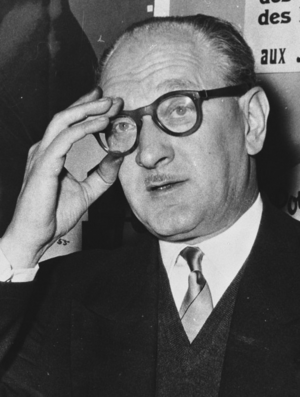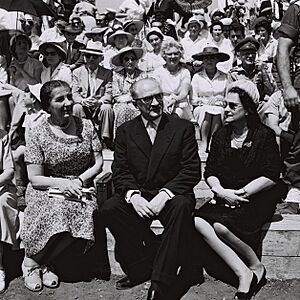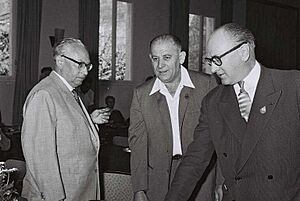Guy Mollet facts for kids
Quick facts for kids
Guy Mollet
|
|
|---|---|

Mollet in 1958.
|
|
| Prime Minister of France | |
| In office 1 February 1956 – 13 June 1957 |
|
| President | René Coty |
| Preceded by | Edgar Faure |
| Succeeded by | Maurice Bourgès-Maunoury |
| Personal details | |
| Born | 31 December 1905 Flers, Orne, France |
| Died | 3 October 1975 (aged 69) Paris, France |
| Political party | SFIO (1923–1969) PS (1969–1975) |
Guy Alcide Mollet (31 December 1905 – 3 October 1975) was an important French politician. He led a socialist political party called the French Section of the Workers' International (SFIO) for many years, from 1946 to 1969. He also served as the Prime Minister of France from 1956 to 1957.
As Prime Minister, Mollet made some big changes inside France. He also worked to bring European countries closer together. He even suggested a union between France and Britain. However, his foreign policy decisions, especially during the Suez Crisis and the Algerian War, made him unpopular with many people in France.
Contents
Early life and education
Guy Mollet was born in a town called Flers in Normandy, France. His father worked in a textile factory. Guy Mollet studied in Le Havre and later became an English teacher in Arras.
Like many teachers at the time, he joined the socialist SFIO party in 1923. By 1928, he became the SFIO leader for the Pas-de-Calais area.
World War II and the Resistance
When World War II started in 1939, Guy Mollet joined the French Army. He was captured by the Germans but was released after seven months.
After his release, he joined the French Resistance. This was a secret group that fought against the German occupation. He was a captain in the Resistance in the Arras area. The German secret police, the Gestapo, arrested and questioned him three times.
Beginning of his political career
In October 1945, after the war, Mollet was elected to the French National Assembly. This is like the French parliament. He represented the Pas-de-Calais region.
In 1946, he became the Secretary-General of the SFIO party. This meant he was the main leader of the party. At the same time, he was also the Mayor of Arras. Mollet was seen as part of the left-wing of his party. He wanted to make sure the socialist ideas stayed strong.
Even though he used some ideas from Marxism, he agreed to work with other parties. These were more central or even centre-right parties during the French Fourth Republic. He did not get along well with the French Communist Party, which was the biggest left-wing party then. He famously said, "the Communist Party is not on the left, but in the East."
Government roles
Mollet served in several important government positions before becoming Prime Minister.
- In 1946, he was a deputy prime minister in the government led by Léon Blum.
- From 1950 to 1951, he was the Minister for European Relations.
- In 1951, he was again a deputy prime minister.
Working for Europe and socialists worldwide
Guy Mollet strongly supported the idea of a united Western Europe. He represented France at the Council of Europe. He also led the Socialist Group within the Council's Assembly.
From 1951 to 1969, he was the vice-president of the Socialist International. This is a worldwide organization of socialist political parties.
Becoming Prime Minister
In the 1956 election, Mollet formed a group of centre-left parties called the Republican Front. This group included his SFIO party, the Radical Party, and others.
The Republican Front won the election. They promised to bring peace to Algeria, which was then part of France. As the leader of the main party, Guy Mollet became Prime Minister in January 1956.
Foreign policy decisions
As Prime Minister, Mollet worked on important international agreements. He helped negotiate and sign the Treaty of Rome. This treaty created the European Economic Community, which was a big step towards today's European Union.
His government also made reforms in other parts of the French Empire. Many places gained more self-rule or independence. However, the situation in Algeria was different and much more difficult.
The Suez Crisis
Mollet wanted to focus on issues inside France. But he faced big problems in foreign policy. Egypt's president, Gamal Abdel Nasser, supported Algerian rebels. Nasser also took control of the Suez Canal, a very important waterway. This led to the Suez Crisis.
Mollet and British Prime Minister Anthony Eden were both worried about keeping their overseas territories. Eden also feared Nasser would cut off oil supplies to Europe. In October 1956, Mollet, Eden, and the prime minister of Israel, David Ben-Gurion, secretly planned a joint attack on Egypt.
Israel invaded Egypt first. British and French troops followed, pretending to restore order in the Suez Canal area. However, the United States strongly opposed this plan. They used their influence at the United Nations and economic pressure. France and Britain were forced to back down.
Eden resigned because of this, but Mollet managed to stay in power, even with strong criticism from the left.
The Algerian War
Mollet's government faced a huge challenge in Algeria. There were about a million French residents in Algeria, which made it hard to simply withdraw.
At first, Mollet wanted to talk with the National Liberation Front (FLN), who were fighting for Algeria's independence. But once he was in office, he changed his mind. He believed the FLN fighters had to be defeated before any talks could happen.
Mollet's visit to Algiers, the capital of French Algeria, was very difficult. People threw rotten tomatoes at him during a protest on February 6, 1956. This event became known as la journée des tomates ("the day of tomatoes").
He sent many French troops to Algeria. They fought a tough campaign, which included torture, especially during the Battle of Algiers. Many French people found this unacceptable. Mollet's government eventually fell in June 1957 because of the high cost of the Algerian War.
Changes inside France
Even with the international problems, Mollet's government made many positive social changes in France. These were often overlooked because of the war in Algeria.
- Welfare: They improved support for sick and elderly people.
- Housing: Funding for housing and regional aid was increased.
- Workers' Rights: Veterans received more payments, and a third week of paid holidays was added for workers. Wages were increased, and medical benefits improved.
- Pensions: State pensions for the elderly and chronically ill were made better.
- Family Support: A national fund for the elderly was set up in June 1956. In December 1956, a law created an allowance for mothers who did not work outside the home.
- Taxes: Sales tax on basic goods was removed.
- Education: A rule in November 1956 stopped written homework for children until the sixth grade. New facilities like medical rooms were required in nursery schools.
- Science and Research: His government encouraged scientific research. They set up research bonuses for scientists. New institutes for nuclear science and applied science were opened.
- Arts: A national diploma in fine arts was created, and a certificate in winemaking (oenology) was started. Teacher training institutes were also founded.
End of government
Mollet's government was the last one formed by the SFIO party, which was becoming less powerful. It was also the last stable government of the French Fourth Republic.
Supporting Charles de Gaulle
In May 1958, a crisis in Algiers led to Charles de Gaulle returning to power. Mollet supported de Gaulle. He believed France needed a new constitution to create stronger governments.
De Gaulle appointed Mollet as one of four Secretaries of State in his first government. This decision caused some socialists to leave the SFIO and form a new party.
Later life and legacy

Mollet left de Gaulle's government in 1959 and did not hold a major office again. He remained the leader of the SFIO party. However, de Gaulle's new French Fifth Republic made the SFIO a less powerful opposition party.
By the 1960s, the SFIO was losing support. In the 1965 presidential election, Mollet supported François Mitterrand for president.
His leadership of the party was increasingly questioned. In 1969, the SFIO had a very poor election result. This led to the SFIO merging with other groups to form the new French Socialist Party. Mollet gave up his leadership role.
Mollet died in Paris in 1975 from a heart attack.
He remains a controversial figure in French politics. His name is often linked to the decline of the SFIO and his tough policy in Algeria. In French politics, the term molletisme sometimes means saying one thing to win elections and then doing something more conservative.
Cabinet members
Guy Mollet's cabinet served from February 1, 1956, to June 13, 1957. Here are some of the key members:
| Portfolio | Holder | Party | |
|---|---|---|---|
| President of the Council of Ministers | Guy Mollet | SFIO | |
| Minister of Foreign Affairs | Christian Pineau | SFIO | |
| Minister of the Interior | Jean Gilbert-Jules | PRS | |
| Minister of Justice | François Mitterrand | UDSR | |
| Minister of the Armed Forces | Maurice Bourgès-Maunoury | PRS | |
| Minister of Finance | Robert Lacoste | SFIO | |
| Minister of National Education | René Billères | PRS | |
| Minister of Social Affairs | Albert Gazier | SFIO | |
| Minister of Veterans Affairs | François Tanguy-Prigent | SFIO | |
| Minister of Overseas France | Gaston Defferre | SFIO | |
| Minister of Algerian Affairs | Georges Catroux | Military | |
| Minister of State | Pierre Mendès France | PRS | |
| Minister of State | Félix Houphouët-Boigny | RDA | |
Changes during his time as Prime Minister:
- On February 14, 1956, Paul Ramadier took over from Robert Lacoste as Minister of Finance.
- On February 21, 1956, Jacques Chaban-Delmas joined the cabinet as a Minister of State.
- On May 23, 1956, Pierre Mendès France left the cabinet.
See also
 In Spanish: Guy Mollet para niños
In Spanish: Guy Mollet para niños
 | Ernest Everett Just |
 | Mary Jackson |
 | Emmett Chappelle |
 | Marie Maynard Daly |


